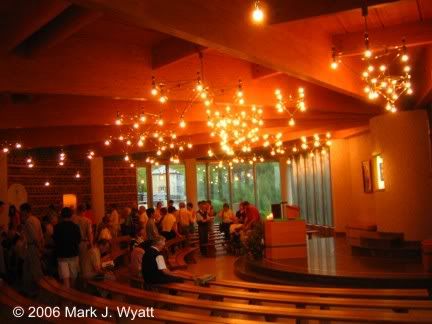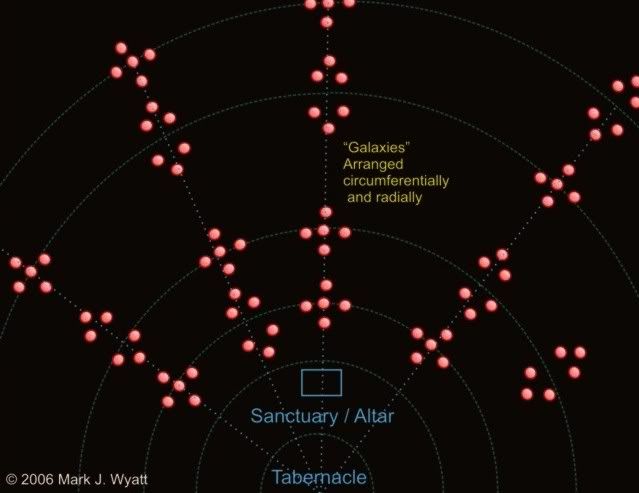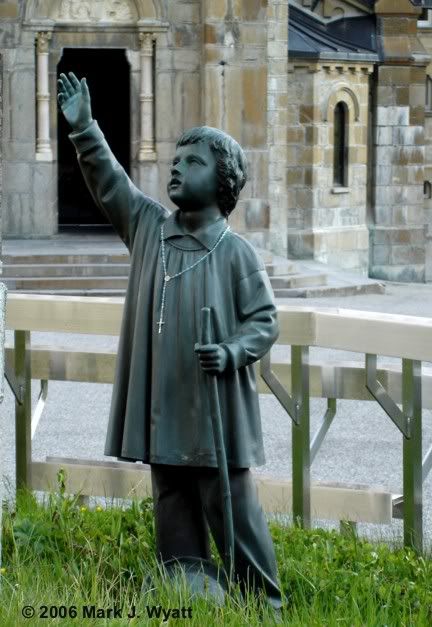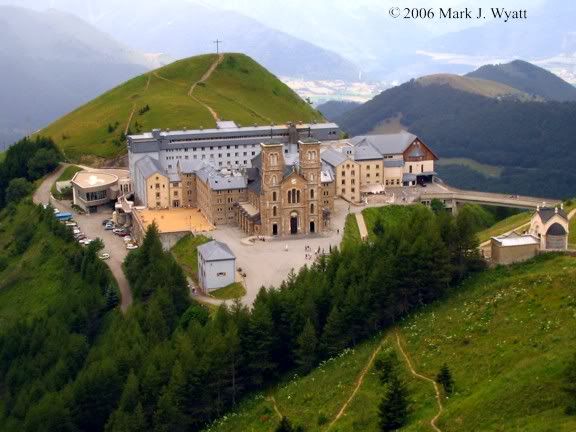
La Salette Basillica
La Salette is considered an important Marian apparition to many Catholics, especially of more traditional outlook. The apparition consisted of a series of dialogues between Mary, a young French girl named Melanie, and a young French boy named Maximin. There were messages given to both, and two secrets, one given to Melanie, and one given to Maximin. According to
this article in the Catholic Encyclopedia, The secrets of Maximin and Melanie were sent to Pope Pius IX in 1851, and:
Maximin's secret is not known, for it was never published.
Mélanie's was inserted in its entirety in brochure which she herself had printed in 1879 at Leece, Italy, with the approval of the bishop of that town. A lively controversy followed as to whether the secret published in 1879 was identical with that communicated to Pius IX in 1851, or in its second form it was not merely a work of the imagination.
The apparitions themselves were approved by the Bishop of Grenoble, Mgr. Philibert de Bruillard. The next Bishop of Grenoble, Mgr. Ginoulhiac, stated in 1851 that only the original apparitions of 1846 were approved by the Church according to this Wikipedia article. The Wikipedia article (as of this writing) also claims that the secrets were never published (as verified by the Catholic Encyclopedia article).
The interesting part is that recently, the secrets have been retrieved from the Vatican and published. This is according to a new book reviewed here, Fathers René Laurentin and Michel Corteville. Maximin's sectret is available by clicking on these links:
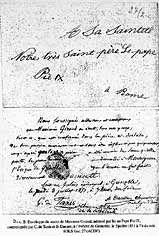
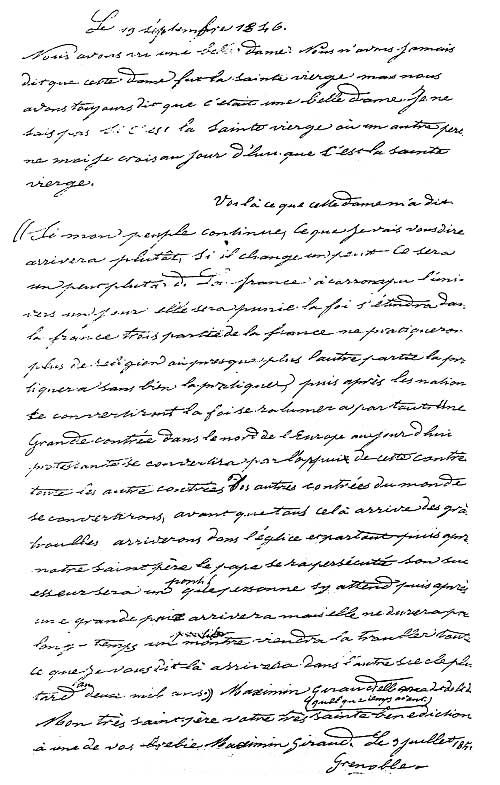
Melanies are available, here:



Note that the secrets are in French. Keep in mind that though (according to the book review), the book has imprimatur, the secrets themselves are still likely not approved. I personally believe they are worthy of study, but I would be careful about putting too much confidence into them until further approval is forthcoming. Note that Melanie's secrets were approved by the Bishop of Leece, Italy, but he was not the local ordinary where the apparitions occured. I am not exactly sure what status that leaves the secret (of Melanie). [Note 8/19/2006: The Bishop of Leece was reprimanded by the Vatican].
Acording to the website reviewing the book, the translation of the secrets is as follows:
[8/28/05: I have added the original French]
Maximin's Secret:
Statue of Maximin
On September 19, 1846, we saw a beautiful Lady. We never said that this lady was the Blessed Virgin but we always said that it was a beautiful Lady. I do not know if it is the Blessed Virgin or another person. As for me, I believe today that it is the Blessed Virgin.
(Le 19 septembre 1846, nous avons vu une belle Dame. Nous n'avons jamais dit que cette dame fut la Sainte Vierge mais nous avons toujours dit que c'était une belle Dame.
Je ne sais pas si c'est la Sainte Vierge ou une autre personne. Moi, je crois aujourd'hui que c'est la sainte Vierge.)
Here is what this Lady said to me:
(Voila ce que cette Dame m'a dit:)
"If my people continue, what I will say to you will arrive earlier, if it changes a little, it will be a little later.
(Si mon peuple continue, ce que je vais vous dire arrivera plus tôt , s'il change un peu, ce sera un peu plus tard.)
France has corrupted the universe, one day it will be punished. The faith will die out in France: three quarters of France will not practice religion anymore, or almost no more, the other part will practice it without really practicing it. Then, after [that], nations will convert, the faith will be rekindled everywhere. A great country, now Protestant, in the north of Europe, will be converted; by the support of this country all the other nations of the world will be converted.
(La France a corrompu l'univers, un jour elle sera punie. La foi s'éteindra dans la France: trois parties de la France ne pratiqueront plus de religion, ou presque plus, 1'autre la pratiquera sans bien la pratiquer. Puis, après [cela], les nations se convertiront, la foi se rallumera partout.
Une grande contrée dans le nord de l'Europe, aujourd 'hui protestante, se convertira: par l'appui de cette contrée toutes les autres contrées du monde se convertiront.)
Before all that arrives, great disorders will arrive, in the Church, and everywhere. Then, after [that], our Holy Father the Pope will be persecuted. His successor will be a pontiff that nobody expects.
(Avant que tout cela arrive, de grands troubles arriveront, dans l'Eglise, et partout. Puis, après [cela], notre Saint-Père le pape sera persecuté. Son successeur sera un pontife que personne [n'] attend)
Then, after [that], a great peace will come, but it will not last a long time. A monster will come to disturb it.
(Puis après [cela], une grande paix arrivera, mais elle ne durera pas longtemps. Un monstre viendra la troubler.)
All that I tell you here will arrive in the other century, at the latest in the year two thousand."
(Tout ce que je vous dis là arrivera dans l'autre siècle, [au] plus tard aux deux millle ans.")
Maximin Giraud
(She told me to say it some time before.)
My Most Holy Father, your holy blessing to one of your sheep.
Grenoble, July 3,1851.
(Maximin Giraud
(Elle [m'] a dit de le dire quelque temps avant).
Mon très Saint Père, votre sainte bénédiction à une de vos brebis,
Grenoble, le 3 juillet 1851.)
Here is the secret of Melanie (from the same source):
Statue of Melanie
JMJ
secret which the Blessed Virgin gave me on the Mountain of La Salette on September 19, 1846
Secr[e]t.
(secret que m'a donné la Sainte Vierge sur la Montagne de la Salette le 19 septembre 1846
Secr[e]t)
Mélanie, I will say something to you which you will not say to anybody:
(Mélanie, je vais vous dire quelque chose que vous ne direz à personne:)
The time of the God's wrath has arrived!
(Le temps de la colère de Dieu est arrivé!)
If, when you say to the people what I have said to you so far, and what I will still ask you to say, if, after that, they do not convert, (if they do not do penance, and they do not cease working on Sunday, and if they continue to blaspheme the Holy Name of God), in a word, if the face of the earth does not change, God will be avenged against the people ungrateful and slave of the demon.
(Si, lorsque vous aurez dit aux peuples ce que je vous ai dit tout à 1'heure, et ce que je vous dirai de dire encore, si, après cela, ils ne se convertissent pas, (si on ne fait pas pénitence, et si on ne cesse de travailler le dimanche, et si on continue de blasphémer le Saint Nom de Dieu), en un mot, si la face de la terre ne change pas, Dieu va se venger contre le peuple ingrat et esclave du démon.)
My Son will make his power manifest! Paris, this city soiled by all kinds of crimes, will perish infallibly. Marseilles will be destroyed in a little time. When these things arrive, the disorder will be complete on the earth, the world will be given up to its impious passions.
(Mon Fils va faire éclater sa puissance! Paris, cette ville souillée de toutes sortes de crimes, périra infailliblement. Marseille sera détruite en peu de temps. Lorsque ces choses arriveront, le désordre sera complet sur la terre. Le monde s'abandonnera à ses passions impies.)
The pope will be persecuted from all sides, they will shoot at him, they will want to put him to death, but no one will not be able to do it, the Vicar of God will triumph again this time.
(Le pape sera persecuté de toutes parts: on lui tirera dessus, on voudra le mettre à mort, mais on ne lui pourra rien, le Vicaire de Dieu triomphera encore cette fois[-là].)
The priests and the Sisters, and the true servants of my Son will be persecuted, and several will die for the faith of Jesus-Christ.
(Les prêtres et les religieuses, et les vrais serviteurs de mon Fils seront persécutés, et plusieurs mourront pour la foi de Jésus-Christ.)
A famine will reign at the same time.
(Une famine règnera en même temps.)
After all these will have arrived, many will recognize the hand of God on them, they will convert, and do penance for their sins.
(Après que toutes ces choses seront arrivées, beaucoup de personnes reconnaîtront la main de Dieu sur elles, se convertiront, et feront pénitence de leur péchés.)
A great king will go up on the throne, and will reign a few years. Religion will re-flourish and spread all over the world, and there will be a great abundance, the world, glad not to be lacking nothing, will fall again in its disorders, will give up God, and will be prone to its criminal passions.
(Un grand roi montera sur le trône, et règnera pendant quelques années. La religion refleurira et s'étendra par toute la terre et la fertilité sera grande, le monde content de ne manquer de rien recommencera ses désordres, abandonnera Dieu, et se livrera à ses passions criminelles.)
[Among] God's ministers, and the Spouses of Jesus-Christ, there will be some who will go astray, and that will be the most terrible.
([Parmi] les ministres de Dieu, et les Epouses de Jésus-Christ, il y en a qui se livreront au désordre, et c'est ce qu’il y aura de [plus] terrible.)
Lastly, hell will reign on earth. It will be then that the Antichrist will be born of a Sister, but woe to her! Many will believe in him, because he will claim to have come from heaven, woe to those who will believe in him!
(Enfin, un enfer règnera sur la terre. Ce sera alors que l’Antéchrist naîtra d'une religieuse: mais malheur à elle! Beaucoup de personnes croiront à lui, parce qu'il se dira venu du ciel, malheur à ceux qui le croiront!)
That time is not far away, twice 50 years will not go by.
(Le temps n'est pas éloigné, il ne se passera pas deux fois 50 ans.)
My child, you will not say what I have just said to you. (You will not say it to anybody, you will not say if you must say it one day, you will not say what that it concerns), finally you will say nothing anymore until I tell you to say it!
(Mon enfant, vous ne direz pas ce que je viens de vous dire. (Vous ne le direz à personne, vous ne direz pas si vous devez le dire un jour, vous ne direz pas ce que cela regarde), enfin vous ne direz plus rien jusqu’à ce que je vous dise de le dire!)
I pray to Our Holy Father the Pope to give me his holy blessing.
(Je prie Notre Saint Père le Pape de me donner sa sainte bénédiction.)
Mélanie Mathieu, Shepherdess of La Salette, Grenoble, July 6, 1851.
J.M.J.+
(Mélanie Mathieu, bergère de La Salette
Grenoble 6 juillet 1851
J.M.J.+)
[Note: (8/11/2006)- Here is a link comparing the Vatican archive version of Melanie's secret (shown on this blog) and a version of the disputed 1876+ release]
Finally, here is the approved message, given to both childen (source- Missionaries of Our Lady of La Salette):
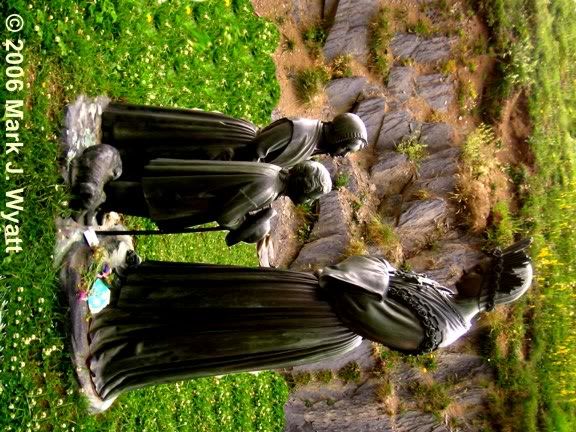
Statue of Mary Talking to the Children
Come near, my children, be not afraid; I am here to tell you great news.
If my people will not submit, I shall be forced to let fall the arm of my Son. It is so strong, so heavy, that I can no longer withhold it.
For how long a time do I suffer for you! If I would not have my Son abandon you, I am compelled to pray to him without ceasing; and as to you, you take not heed of it.
However much you pray, however much you do, you will never recompense the pains I have taken for you.
Six days I have given you to labor, the seventh I had kept for myself; and they will not give it to me. It is this which makes the arm of my Son so heavy.
Those who drive the carts cannot swear without introducing the name of my Son. These are the two things which makes the arm of my Son so heavy.
If the harvest is spoilt, it is all on your account. I have you warning last year with the potatoes ('pommes de terre') but you did not heed it. On the contrary, when you found the potatoes spoilt, you swore, you took the name of my Son in vain. They will continue to decay, so that by Christmas there will be none left.
Ah, my children, do you not understand? Well, wait, I shall say it otherwise.
If you have wheat, it is no good to sow it; all you sow the insects will eat, and what comes up will fall into dust when you thresh it.
There will come a great famine.
Before the famine comes, the children under seven years of age will be seized with trembling and will die in the hands of those who hold them; the others will do penance by the famine.
The walnuts will become bad, and the grapes will rot. If they are converted, the stones and rocks will change into mounds of wheat, and the potatoes will be self-sown in the land.
Do you say your prayers well, my children?
Both answered with complete frankness. "Not very well, Madam."
Ah, my children, you must be sure to say them well morning and evening. When you cannot do better, say at least an Our Father and a Hail Mary. When you have time, say more.
There are none who go to Mass except a few aged women. The rest work on Sunday all summer; then in the winter, when they know not what to do, they go to Mass only to mock at religion.
During Lent, they go to the meat-market like dogs.
Have you never seen wheat that is spoilt, my children?
"No, Madam," they replied.
But you, my child [Maximin], you must surely have seen some once when you were at the farm of Coin with your father.
The owner of the field told your father to go and see his ruined wheat. You went together. You took two or three ears of wheat into your hands and rubbed them, and they fell to dust.
Then you continued home. When you were still half and hour's distance from Corps, your father gave you a piece of bread and said to you: "Here, my child, eat some bread this year at least; I don't know who will eat any next year, if the wheat goes on like that."
Confronted with such precise details, Maximin eagerly replied, "Oh yes, Madam, I remember now; just at this moment I did not remember."
Then the Lady, again speaking French as the beginning of her discourse and when giving the secrets, said to them:
Well, my children, you will make this known to all my people.
